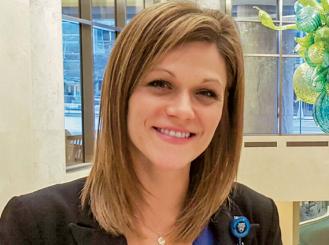Feb 23, 2016
By Shira Klapper, Senior Writer
As an oncology trainee, you’ve logged years of hard work on the path to becoming an oncologist—as a medical student enduring marathon study sessions, as a resident pulling all-nighters, and then as a fellow learning the ropes of supervising students of your own. Finally, you’re ready to venture out and land your first job as a full-fledged attending. But while fellows have an encyclopedic knowledge of medical oncology, they may need some brushing up on an equally significant area of study: interviewing skills.
To provide trainees with the know-how they need to shine during interviews, ASCO Connection will publish a series of Q&As with medical recruiters from some of the top organizations in the country, including academic medical centers, private practices, industry, and government. In this first article of the series, Marissa J. Anderson, a physician recruiter at Mayo Clinic, shares her tips for acing your interview.
AC: What are the top things interviewees can do to make a good first impression with the medical recruiter?
MA: We recently provided a “lunch and learn” at Mayo Clinic for our residents and fellows on this topic. I emphasized that one of the most important things to remember during an interview is to be polite, not only to the people you think are the main decision-makers, but also to people like support staff, the medical recruiter, and others. Even though the final decision is made by the department search committee, they solicit outside feedback. How you treat others during the process often indicates how you will treat nurses or allied health staff. Be aware that that your responses and behavior are shared with the search committee from the moment you enter the building.
Second, do your research. Get to know the organization you’re interviewing for (or talking to, if you’re not at the interviewing stage yet). A little research beforehand will allow you to compose questions that show you’re serious about the job and are knowledgeable and prepared.
Third, always act professional. Use manners, be appropriately expressive, keep your cell phone out of sight and on silent, and dress appropriately, which in this case means a suit. Lastly, be careful not to make salary seem like your main motivator. There’s a way to ask about it so you have a general idea what it will be. Often, it will come up in the general discussion, but don’t have it as one of your first questions.
AC: What questions should interviewees expect to be asked at every interview?
MA: Trainees should expect a question about what their future goals are in terms of their professional life. For example, they might be asked, “Where do you hope to be in 5 years?” The interviewer will want to see that the institution’s goals align with the career goals of the trainee.
At Mayo Clinic, we also want to see whether the interviewee will be a good cultural fit for our organization. We might conduct a behavioral-based interview, with questions related to past experiences and, typically, designed to assess the interviewee’s performance in several categories, such as teamwork, customer service, quality, and patient care. Interviewees should be prepared to speak to specific examples in relation to those types of categories. The Chair of the department might have different questions, but from an HR perspective, these are often part of the interview.
AC: Can you say more about what you mean by “cultural fit?”
MA: For Mayo Clinic, teamwork is a huge component of our culture, so we want to see that the trainee is, and has been, a team player. Some other practices may be more individual-focused, but at our organization we have physician assistants, nurse practitioners, and nurses who work closely with our physicians, so we try to see how the interviewee would work with those individuals. In addition, here at Mayo we have a patient-centered culture, so we’ll be looking for behaviors that show you put patients first.
The interview is also a time when the interviewee should be assessing whether his or her skills and professional needs fit the organization’s culture. Some people work better as a team and some people work better individually. Understanding how you work best will allow you to know if a specific organization will bring out that quality in you. The trainee should be interviewing us just as much as we’re interviewing them. We want it to be a good fit from both of our perspectives—we don’t want you to feel like you made a wrong choice and leave within 2 years.
AC: What would you say to the fellow who might become shy or nervous during interviews?
MA: Not long ago, I sat down with a fellow who described herself as an introvert and I gave her some suggestions. To sum up in one word what I said to her: practice! There are different ways to practice when you have limited time to interview. For this individual, I said, if you have time while you are at a conference, such as the ASCO Annual Meeting, if there is a career-focused area, go to that area and take time to talk to several organizations, not just ones you necessarily think you want to work at. Put yourself out there and talk to the recruiters and practice your elevator “who am I” speech that you have ready so you can get used to talking about yourself, which is one of the hardest things to do.
In an informal environment such as a conference career fair, where you’re talking to organizations that you personally don’t have high stakes in, you can feel more comfortable practicing for how you will present yourself in a “real” interview. Maybe you’ll end up doing great and finding out that the organization is different than what you thought, and it may be someplace you’d consider for a job in the future.
If talking to people at a career fair seems overwhelming at first, just practice your speech in a mirror, choosing three to five things you would want individuals and organizations to know about you in regards to how you set yourself apart, what goals you have for your future career, and so forth. Think: If you had 2 minutes to talk about yourself, what three to five things will you want to convey to people? You can also practice at social events, not necessarily with your friends, by putting yourself out there and introducing yourself to people you may not typically introduce yourself to. By sharing a little bit about yourself, you become more comfortable with not being comfortable.


